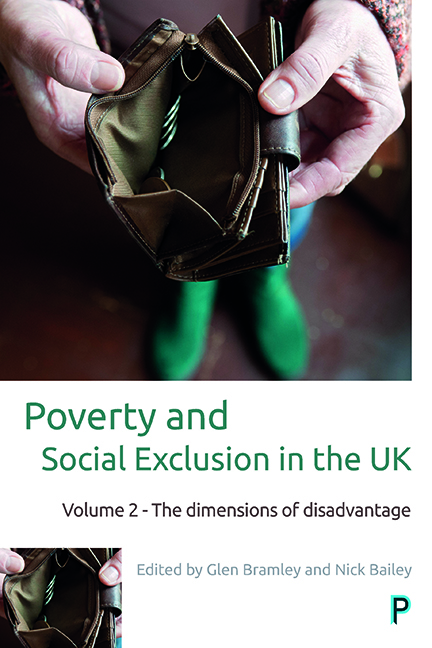eight - Poverty and health: thirty years of progress?
Published online by Cambridge University Press: 12 April 2022
Summary
Introduction
Health is a marker of the development of societies (Marmot, 2007). The wealth and prosperity of nations are embodied in the welfare of its citizens (Hoff, 2008). Overall, health has improved over the course of the twentieth century for many countries, particularly those forming part of the Organisation for Economic Cooperation and Development (OECD) (Marmot, 2007). However, disparities in the distribution of poor health persist between and within countries. Systematic differences in the risk of suffering a multitude of physical and mental illnesses by socio-economic groups reflects the organisation of societies, and specifically the distribution of wealth, resources and opportunities. Interest in the relationship of poverty and health, therefore, has come to focus on a moral concern with inequalities and the unfair, avoidable social structuring of poor health (Braveman and Gruskin, 2003).
On an international scale, systematic patterning in health is demonstrated by the variations in life expectancies that are observed between countries; in 2013 the range in life expectancy at birth between countries was 37 years for men, and 41 years for women (WHO, 2015). Marked inequalities have also been observed within countries and even in cities. For instance, life expectancies in the most affluent areas of Glasgow were reported at 82 years, compared to 54 years in one of the most deprived areas (Hanlon et al, 2006). The life expectancy for individuals in some deprived areas of Scotland was thus worse than the average in India (Marmot, 2007).
Inequalities in a variety of health outcomes have been demonstrated with a range of socio-economic and status measures. The Black Report produced by the Working Group on Inequalities in Health helped invigorate research and policy interest in health inequalities by demonstrating disparities in mortality rates based on social class (Townsend et al, 1992). It identified material or socio-economic factors such as income, education and housing as the most important drivers of these inequalities. The WHO Commission on Social Determinants of Health compiled a wealth of evidence on the structuring of health by social conditions, demonstrating the ‘poor health of the poor, the social gradient in health within countries, and the marked health inequities between countries are caused by the unequal distribution of power, income, goods, and services’ (WHO 2008, p 1).
- Type
- Chapter
- Information
- Poverty and Social Exclusion in the UK Vol 2The dimensions of disadvantage, pp. 203 - 224Publisher: Bristol University PressPrint publication year: 2017



